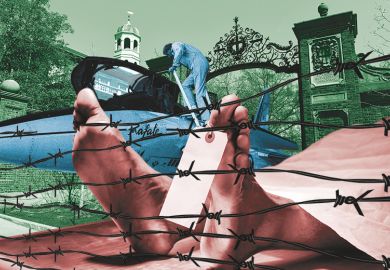With £5 million of funding and big names already on board, the Centre for Global Higher Education aims to have an impact – including by looking critically at “impact” and other major issues facing the world academy.
The CGHE is a partnership led by the UCL Institute of Education that includes Lancaster University, the University of Sheffield and eight international institutions. It is being launched with five-year funding from the Economic and Social Research Council and the Higher Education Funding Council for England.
Simon Marginson, the CGHE’s director and professor of international higher education at the IoE, referred to another ESRC-funded project – the respected Institute for Fiscal Studies – when he talked about the centre’s role. The IFS, he said, “makes a major contribution to the country long term by providing really strong data and being an authoritative voice. Our role is to build that authoritative voice [in higher education] and to understand higher ed better than anyone else, in a research sense.”
The CGHE, which will formally open in October, will “provide wisdom, advice and intellectual judgement about the sector” via research, consultancy, events and media engagement, he added.
Professor Marginson will be supported by deputy directors Claire Callender, professor of higher education policy at Birkbeck, University of London and professor of higher education studies at the IoE, and William Locke, reader in higher education studies at the IoE.
Other well-known names on the centre’s 23-strong research team include Sir Peter Scott, professor of higher education studies at the IoE.
The CGHE has also created seven postdoctoral positions that will “create a cohort of next-generation HE researchers”, he said.
Higher education studies is a field that until now was “carried by individuals, not by large groups”, the CGHE director continued. Impact was “central to our bid” for funding, he added: indeed, one of the centre’s stated goals is to “maximise impacts in higher education policy in the four UK nations and worldwide”. But impact is also one of the major issues the CGHE will examine, Professor Marginson said: “I think there are a lot of problems in the way we measure impact…but we need to do it.”
Initially the centre will run 13 research projects across three programmes: globalisation, UK higher education and the public contributions of higher education institutions; the socio-economic implications of high-participation higher education; and institutions, people and learning in local/global higher education settings.
In the first category, Professor Marginson will lead a project titled “Local and global public good contributions of higher education: a comparative study in six national systems”. In the second, a project led by Lorraine Dearden, professor of economics and social statistics at the IoE, will examine UK funding reforms, for example.
Looking to the future, Professor Marginson said: “My gut feeling is that the UK is doing research really well, but not necessarily doing teaching and learning as well.” Lower standards in those areas may be “where we’ve paid the price of massification without sufficient funding”, he added.
But how do you analyse teaching quality, given the absence of metrics? “I think in the end we’re going to have to get to grips with graduate outcomes in terms of measuring learning achievement,” Professor Marginson said. He hoped that the centre would “further the discussion about comparative learning achievement” and apply “more pressure on learning quality”.
Professor Marginson added that the centre would also “broaden the highway between UK HE and East Asia”. Among its research team are scholars from Hong Kong, Japan and China, notably Nian Cai Liu, dean of the Graduate School of Education at Shanghai Jiao Tong University and developer of the Academic Ranking of World Universities.
Asked about the global higher education policy myths he would like to see challenged, Professor Marginson cited the idea that “one can measure the role of higher education through incomes earned and rates of employment. That’s the general assumption of the political system on both sides of politics in most countries. It’s not a case of it being completely wrong; it’s a case of it being inadequate.”
“There is a vital job here in making a complex picture more comprehensible for the public,” said Professor Marginson. “I see that as a central function that you [journalists] and I play in the sector.”
In numbers
£5m – ESRC and Hefce funding to get the Centre for Global Higher Education up and running
Campus news
University of Manchester
Research by a master’s student has revealed the true meaning of a 15th-century painting. The work, by an unknown German artist, was thought to depict the Virgin Mary. However, Anna Rhodes, an MA student in art history and visual studies at the University of Manchester, discovered that it actually depicts St Catherine of Alexandria, the 4th-century Christian martyr. The painting will now be conserved and put back on display at the West Park Museum in Macclesfield.
Ulster University
Scientists at Ulster University have developed a drug that could help to reverse the weight gain and higher blood glucose levels commonly associated with diabetes. A team led by Nigel Irwin, senior lecturer at Ulster’s Biomedical Sciences Research Institute, combined an existing Type 2 diabetes medication with an appetite suppressant. In a study using diabetic mice, a twice-daily dose of the drug over three weeks was associated with significantly lower body weight and improved metabolic control.
Edge Hill University
Academic researchers are aiming to improve the health and well-being of Everton Football Club’s workforce. The study, conducted by Edge Hill University, asks staff to complete a survey on a range of topics including their sleep patterns, exercise regimes and diet. The findings will be used to develop an improved well-being programme tailored to the needs of employees, Edge Hill said.
Arts University Bournemouth
A university has launched a £1 million appeal to fund a new drawing studio for students that will boast renowned artist David Hockney as its patron. The studio, planned by Arts University Bournemouth, has been designed by architect Sir Peter Cook, an alumnus of the institution. Stuart Bartholomew, principal and vice-chancellor of the university, said the institution was keen to “reassert the centrality of drawing” on its courses.
Staffordshire University
A graduate has won £10,000 of Big Lottery funding to inspire young parents to become journalists. Kimberly Bond, a journalism graduate from Staffordshire University, set up Visit from the Stork, a website for parents and parents-to-be under 25, after completing the university’s Speed Plus course, which trains alumni looking to start new businesses. She will use the grant to launch the Stork Academy, which will teach media skills to parents.
Anglia Ruskin University
The global food system’s vulnerability to extreme weather and pandemics has been highlighted in a study based on university research. The report, published by insurance specialist Lloyd’s, details work by academics at Anglia Ruskin University’s Global Resource Observatory. It shows how three scenarios – the impact of El Niño, the spread of windblown wheat rust in Russia and warmer temperatures in South America – could quadruple wheat, maize, soybean and rice prices.
University of Reading
Plans to refurbish an award-winning building on a university campus and make it the home of a new School of Architecture have been unveiled. Renovation of what is known as the “Lego building” at the University of Reading will begin in January 2017. The building will house new teaching, research and learning facilities and will be predominantly open plan in a bid to provide “a creative hub for innovative thinking”.
King’s College London
A master’s module on “the Blair years” has been launched by the former UK prime minister himself. The postgraduate course at King’s College London will be co-taught by John Rentoul, chief political commentator for The Independent on Sunday and biographer of Mr Blair, and Jon Davis, director of partnerships and the Strand Group at King’s. The course will feature lectures from Lord Mandelson, Lord Adonis, Sir Michael Barber and other senior political figures from the period 1997 to 2007. The module will run from this autumn.
POSTSCRIPT:
Article originally published as: ‘Authoritative voice’ set to project on the world stage (25 June 2015)
Register to continue
Why register?
- Registration is free and only takes a moment
- Once registered, you can read 3 articles a month
- Sign up for our newsletter
Subscribe
Or subscribe for unlimited access to:
- Unlimited access to news, views, insights & reviews
- Digital editions
- Digital access to THE’s university and college rankings analysis
Already registered or a current subscriber? Login




